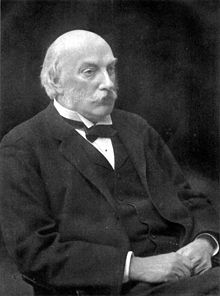John Strutt, 3rd Baron Rayleigh
English physicist (1842–1919)
John William Strutt (12 November 1842 – 30 June 1919) was an English physicist who, with William Ramsay, discovered the element argon, an achievement for which he earned the Nobel Prize for Physics in 1904. He also discovered the phenomenon now called Rayleigh scattering, explaining why the sky is blue, and predicted the existence of the surface waves now known as Rayleigh waves.


| This article about a physicist is a stub. You can help out with Wikiquote by expanding it! |
Quotes
edit- In science by a fiction as remarkable as any to be found in law, what once been published even though it be in the Russian language, is spoken of as known, and it is too often forgotten that the rediscovery in the library may be a more difficult and uncertain process than the first discovery in the laboratory.
- Lord Rayleigh (1884) as cited in: Brian Vickery (1958) Classification and indexing in science. Preface
- Without encroaching upon grounds appertaining to the theologian and the philosopher, the domain of natural sciences is surely broad enough to satisfy the wildest ambition of its devotees. In other departments of human life and interest, true progress is rather an article of faith than a rational belief; but in science a retrograde movements is, from the nature of the case, almost impossible. Increasing knowledge brings with it increasing power, and great as are the triumphs of the present century, we may well believe that they are but a foretaste of what discovery and invention have yet in store for mankind. … The work may be hard, and the discipline severe; but the interest never fails, and great is the privilege of achievement.
- Address to the British Association in Montreal (1884)
- The history of this paper suggests that highly speculative investigations, especially by an unknown author, are best brought before the world through some other channel than a scientific society, which naturally hesitates to admit into its printed records matter of uncertain value. Perhaps one may go further, and say that a young author who believes himself capable of great things would usually do well to secure the favourable recognition of the scientific world by work whose scope is limited, and whose value is easily judged, before embarking upon higher flights.
- About John James Waterston's rejected paper about ideal gas kinetic energy. Lord Rayleigh (1892). Introduction to Waterston's Memoir "On the physics of media that are composed of free and perfectly elastic molecules in a state of motion", Philosophical Transactions, 183A, p. 1-5. Royal Society.
- The only merit of which I personally am conscious was that of having pleased myself by my studies, and any results that may be due to my researches were owing to the fact that it has been a pleasure for me to become a physicist.
- On receiving the Order of Merit (1902)
Quotes about him
edit- There are some great men of science whose charm consists in having said the first word on a subject, in having introduced some new idea which has proved fruitful; there are others whose charm consists perhaps in having said the last word on the subject, and who have reduced the subject to logical consistency and clearness. I think by temperament Lord Rayleigh belonged to the second group.
- J. J. Thomson's assessment of Lord Rayleigh in his memorial address given in Westminister Abbey. Strutt, R. J., 4th Baron Rayleigh, Life of John William Strun, Third Baron Rayleigh, O.M., F.R.S. (Madison: University of Wisconsin Press, 1968), p. 310.
- Quoted in Chandrasekhar, Subramanyan. "The pursuit of science." Minerva (1984): 410-420.